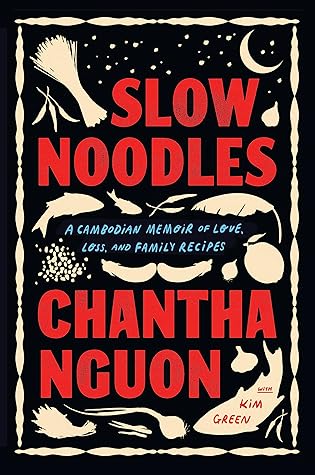More on this book
Community
Kindle Notes & Highlights
Read between
July 2 - July 22, 2024
Cambodia has a rich past, a mosaic of flavors from near and far: South Indian traders gave us Buddhism, an alphabet, and spicy curries; China brought rice noodles and astrology; and French colonizers passed on a love of strong coffee, pâté, flan, and a light, crusty baguette. We lifted the best tastes from everywhere and added our own: sour pickled fruits and vegetables, the famous Kampot peppercorn, and the most distinctive flavor of all: prahok, Cambodia’s (in)famous fermented fish paste.
Once you have learned how to lose everything, there’s nothing left to fear. A poor woman’s heart grows stouter as her options narrow. She has no choice but to make bold moves, take wild chances, tempt fate.
And I see now that rebuilding a traumatized society after genocide takes many generations of investment—there are no quick fixes. That’s what Slow Noodles means to me.
The memory of hunger is a curse that never leaves you. The memory of happiness also lingers—I will never forget its flavors and aromas. It smelled like cloves, cracked pepper, and pâté de foie.
Rice is what you eat when you have nothing and when you have everything. In one Khmer proverb, it is the “blood and sweat” of the farmer; another rice saying delivers a lesson about pride: “The immature rice stalk stands upright. The mature stalk, heavy with grains, bends over.” In other words, a willingness to bend with changing winds is a valuable trait, especially when the winds become fierce and destructive.
Those visits to my rich and poor grandmothers’ houses instilled in me a wariness of wealth. There seemed to be an inverse relationship between status and generosity, and I could not understand why.
He had never expected such richness from life in the first place and was less inclined to feel disappointed by how little of it was delivered.
It didn’t take long to realize that the recipe for building theoretical utopias was not to my taste. It was a simple process of (mostly) subtraction: remove choices. Deduct harmless indulgences, personal expression, and culinary creativity. Add a pinch of patriotic slogans and songs. Garnish with banners and stars.
You have no soul in you today. Let’s go and get a coffee.”
Chan and I said goodbye to the family that had helped us, and they wished us luck. Those kind, laughing people had taken us in without ceremony, and they bid us farewell in the same way. We knew we would never see them again, which made their gift of shelter and food all the more extraordinary—there was nothing in it for them. What a stroke of good luck, to be so tenderly cared for by strangers.


